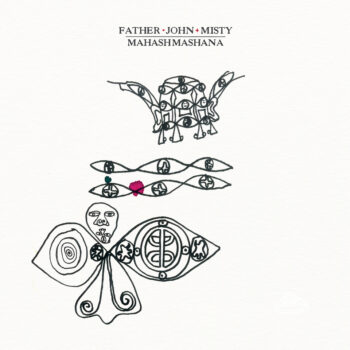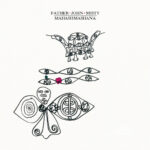Mystic songwriter Josh Tillman’s ‘Mahashmashana’ is at its best when he goes to “Screamland” as Father John Misty.
‘Mahashmashana’ – Father John Misty
“Screamland” is the savory emotional center arriving at the halfway mark of Mahashmashana, the sixth album from Father John Misty (the stage name of musician Josh Tillman), out today via Sub Pop Records.
Loosely conceptual, as are most of Misty’s records, the album’s title is the Sanskrit word for a Hindu cremation ground. The record represents the vulnerability between life and death quite well, walking a tightrope that risks falling into pretension but elegantly manages to make it.
Before the breakthrough of “Screamland,” the album could play as conceited to cynics.
Ultimately, it is sensational.

Tillman attempts to do your eyes dewy right out of the gate with some Disney-adjacent soundtrack strings on the album’s title track. The dude willing to be seen smoking cigarettes in his publicity photos is serving a decidedly different Disney here, as the contrast against the deeply psychedelic undertones of this overture show.
Tillman spends much of the track crooning, and while his voice isn’t entirely up to carrying the song on its own, the lament of loneliness as he sings, “I drive around the city, the place I knew is gone,” does the trick. He leaves us properly teed up for the emotional swing and swell at the back end of the track, signaling we are going somewhere.
Is Mahashmashana about to be a mess or a masterpiece?
The answer is much closer to the latter, and as for the former, do not let it detract! Just go for it and climb inside Tillman’s head to understand the confidence of where the next cut comes from.

“She Cleans Up,” the album’s single, is the most conventional and straightforward song on Mahashmashana. Sounding like the Cake hit, the groovy fuzz bass here isn’t as sweet, but still goes “The Distance.” If this burst of aggressive sermonizing is as preachy as Misty gets on Mahashmashana, I am okay with being his parishioner.
Less obviously, and perhaps more to the song’s dark qualities, we hear something akin to the opening credit sequence of the under-seen zombie film PLANET TERROR, directed by Robert Rodriquez, who also composed its score, John Carpenter-style. Perhaps eventually, more people will hear “She Cleans Up” than have seen PLANET TERROR. I hope Tillman will see it to understand what I am talking about.
+++
“Planet Terror (Main Titles)” by Robert Rodriguez from Grindhouse (Original Soundtrack)
+++
“Dreamt about it last night, and it did my whole day in” is compelling and adept wordplay and imagery, but in a Chappell Roan world of endless candy choruses, I feel like I am owed one, even from a bearded white guy. This is an overall note and not a criticism of Tillman, specifically. The song is what it wants to be, but there is also potential here to be less shy about hammering home his very solid setup with an utterly shameless earworm.
As it is, I am happy to take the Morphine-esque sax spaz-outs throughout “She Cleans Up,” along with the tension and urgency of lyrics like, “Use your discretion, so I don’t have to use mine. Spent $100 on gas, baby, let’s just have a good time.”
Thanks for the four-minute crime novel, bro!
Despite my demands for a more blatant sing-a-long moment, “She Cleans Up” reminds us why Tillman has contributed to albums by Beyoncé, Lady Gaga, and Post Malone. Misty has the ambitions of a hitmaker at heart and the invitation to watch him as he opens and operates on his is part of the man’s charm.
Is there such a thing as being too enlightened?
Discovering psychedelics and, for many, the resultant, possibly deluded “meaning of life” can lead to wanting to then discover “truth” again and again instead of taking away something along the lines of, “Hey, that was some good learning. I am forever changed and don’t need to be further informed by the universe. I certainly don’t need to be given lessons about my spirituality or psychology from songwriters, that’s for sure!”
This is the tightrope Tillman so deftly walks on Mahashmashana, and to his credit, any fleeting moments of cliche or condescension come off as Misty just being Misty. We are left feeling that Tillman’s experiences are human and that thoroughly enjoying Mahashmashana means willingly walking with him into his psychosis of sorts. Forget feelings of subservience to Father John.
He is not preaching! He is relating.
It is risky to allow ourselves to embrace and understand someone else’s personal journey and then further allow them to inform our lives through these empathetic and compassionate alliances. We choose how much we want them to color our world.
“Screamland” offers that opportunity.
The track is the emotional centerpiece of Mahashmashana, and while much of what comes before might register as slightly self-important to the uninitiated, none of it feels inauthentic when taking into account Tillman’s evangelical upbringing and what sounds like mindful management of his tenuous relationship with secular society. For a child of God who became a Father, there is a lot of the Devil’s business going on here.
In other words, bro is working it out in public, and isn’t that what we are here for? As fellow residents of “Screamland” for its seven-minute running time, we find Tillman’s strongest lyrics on Mahashmashana are here.
“Like a f* up with a dream, stabbing at the ashtray like it might give up the truth” is as pure a confessional as one can ask for. Tillman’s talk in the media about microdosing acid hammers the idea home. We want our artists to take the hits (physically, metaphysically) and then tell us about them in gory detail later.
Father is “daddy” for that on this track.
Seconds later, the song explodes into a chorus we expect but aren’t prepared for. It feels like the exhaustion of built-up frustration created by circumstances we didn’t deserve but convinced ourselves we earned anyway.

Sonically, we hear God throwing down with Satan, represented by the ethereal orchestrations and gritty, grounded elements presented throughout the album, finally waging war.
“Screamland” justifies its title at this moment.
The presence of guitarist Alan Sparhawk of Low is particularly notable on this track, considering the still-so-recent loss of his partner in music and art, Mimi Parker. Sparhawk’s pain is palpable, and like Misty, he is sharing it nakedly, even reveling in it.
We all are left with this kind of raw display when we reach our ultimate metaphorical (or actual) fate on the Mahashmashana burn pile. Every one of us was forced into existence, but we gradually lose our standing for complaint when we look back and realize that we enjoyed ourselves.
Suddenly, just like life, “Screamland” cuts out.
— —
:: stream/purchase Mahashmashana here ::
:: connect with Father John Misty here ::
— —
“Screamland” – Father John Misty
— — — —

Connect to Father John Misty on
Facebook, Twitter, TikTok, Instagram
Discover new music on Atwood Magazine
© Ward & Kweskin
Mahashmashana
an album by Father John Misty


 © Ward & Kweskin
© Ward & Kweskin





